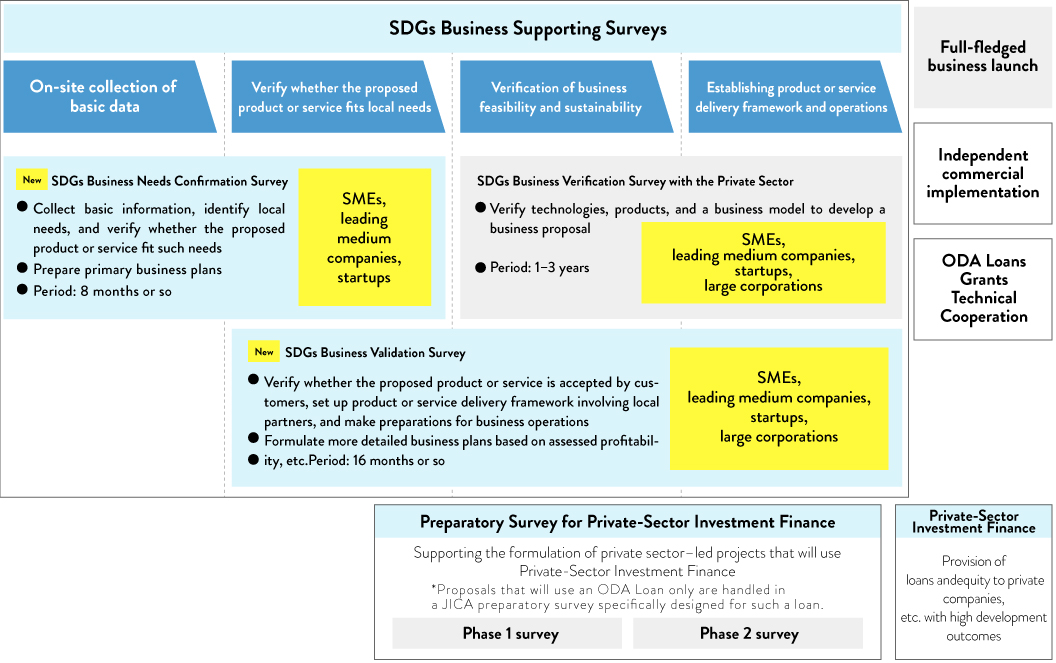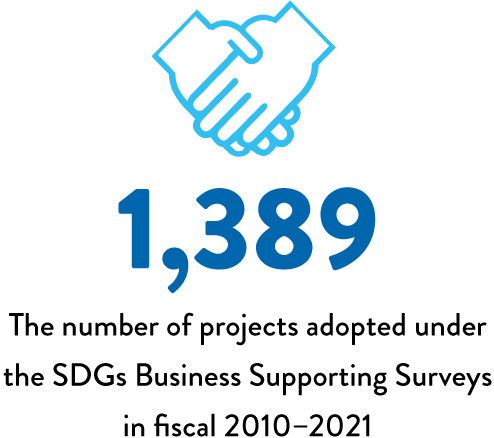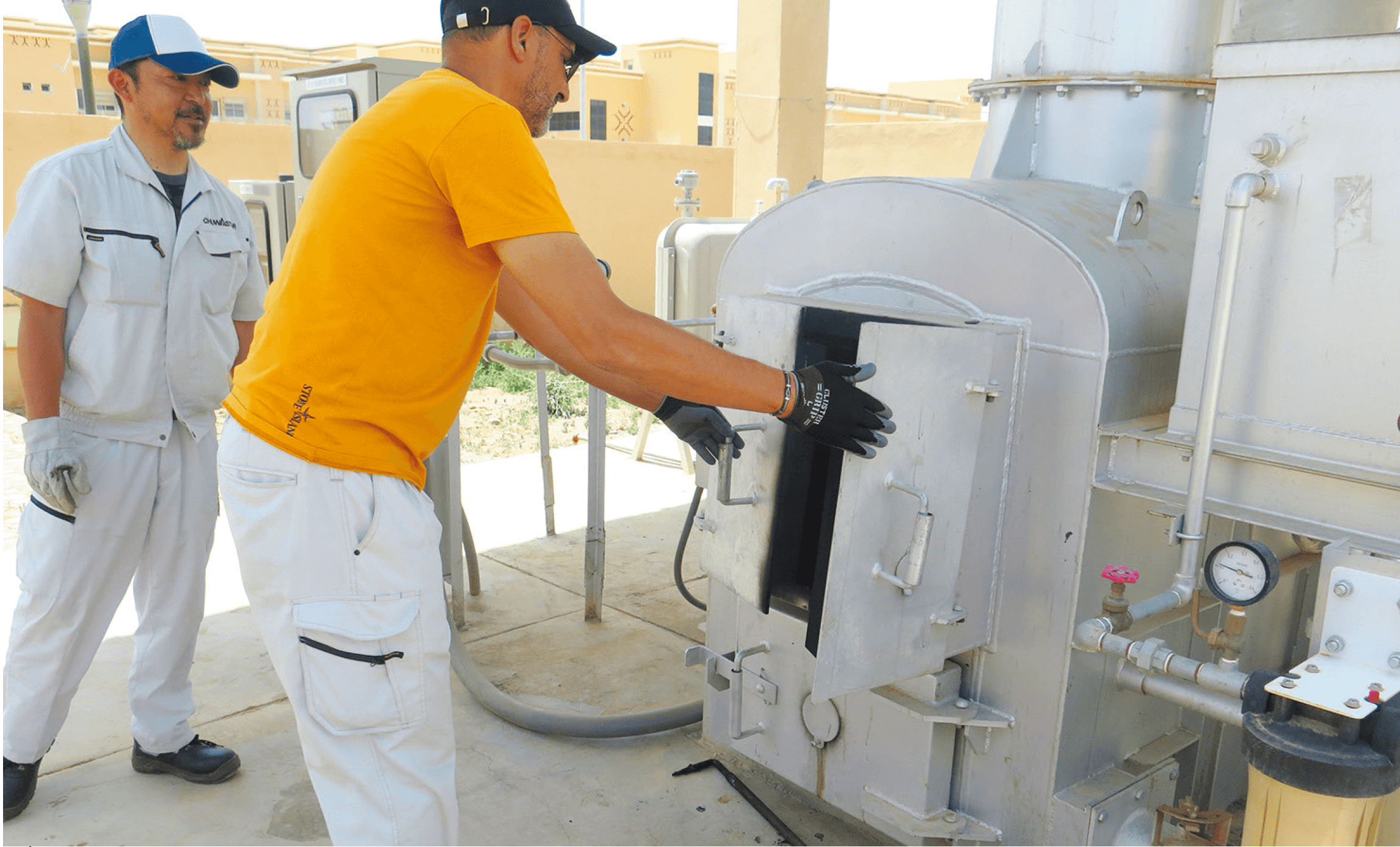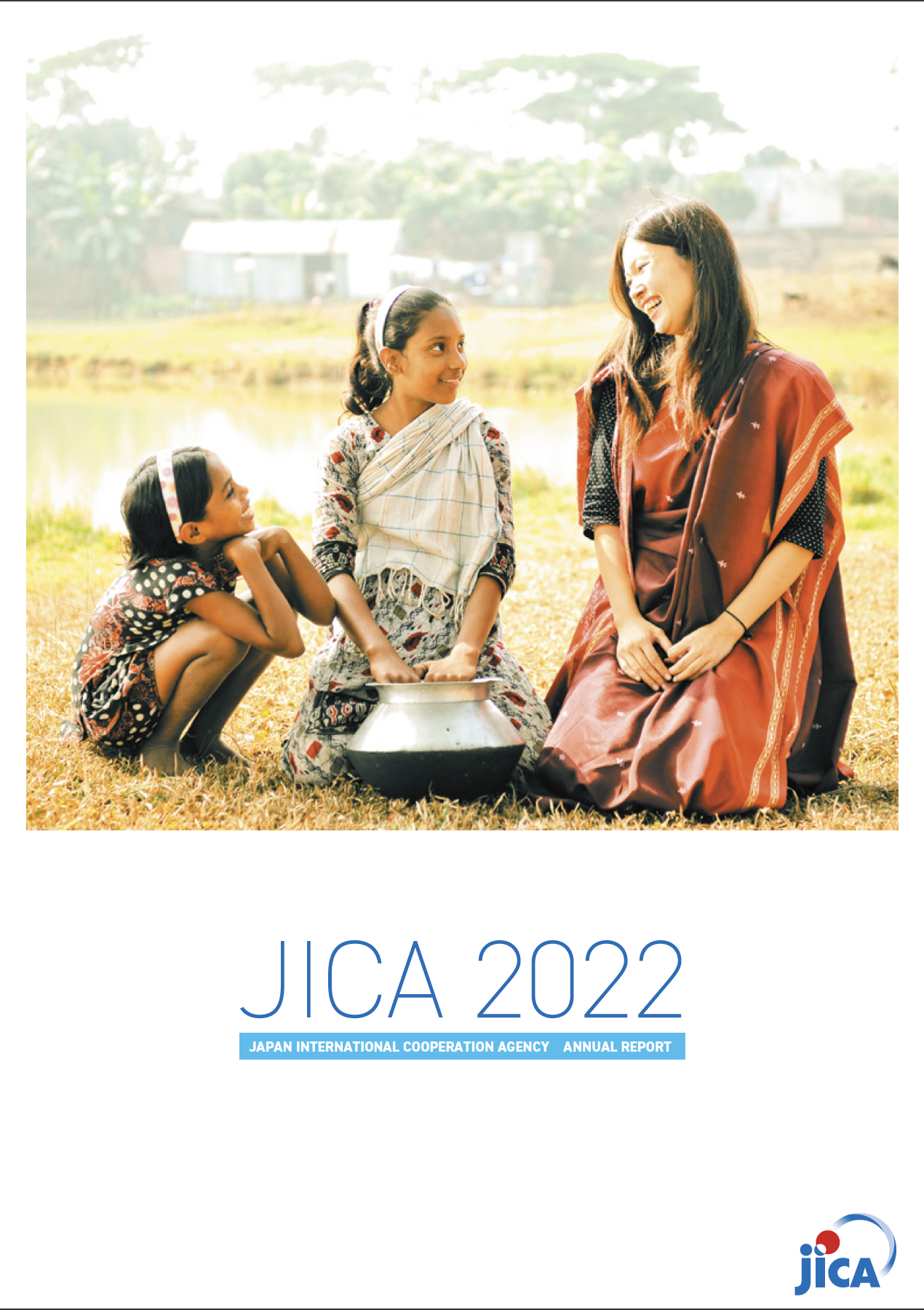partnership
Cooperation with the Private Sector

Supporting Economic and Social Development through Private-Sector Business Activities
JICA has networks and trusting relationships with the governments of developing countries as well as the know-how in project implementation in the developing world gained through ODA over many years. While making use of these assets, JICA provides wide-ranging support schemes, as shown in the figure at right, to produce better development results efficiently and effectively through further collaboration with the private sector.
Private-Sector Investment Finance
Economic and social development support in developing countries by the private sector
Of the Finance and Investment Cooperation provided by JICA, Private-Sector Investment Finance (PSIF) is a scheme to support— through the provision of loans and equity— private enterprises around the world, including Japanese companies that conduct business with high development outcomes in such sectors as infrastructure development, poverty reduction, and measures against climate change.
Through collaboration with private and international financial institutions and combined operations with JICA’s other ODA programs and projects, JICA makes efforts to reduce various risks associated with projects and to further improve development outcomes. JICA is particularly strengthening cooperation with international organizations in order to promote co-financing. Over the past years, JICA has signed memoranda of cooperation (MOC) with the U.S. International Development Finance Corporation, the Agence Française de Développement, the African Development Bank, and the European Investment Bank.
In fiscal 2021, JICA approved 13 projects under PSIF. These included the Health Care Sector Enhancement Project in Brazil and the project to support COVID-19 response in Africa, among other projects to strengthen health systems in the face of the COVID-19 pandemic; the Quang Tri Province Onshore Wind Power Project in Viet Nam and the DX Start-ups Investment Project in India, among other projects to address advanced and important agenda items such as decarbonization, digital transformation (DX), and startup assistance.
Preparatory Survey for Private-Sector Investment Finance
Supporting the formation of promising PSIF projects
This scheme is designed to identify and formulate projects that capitalize on the expertise of Japan’s private sector. Under the scheme, JICA entrusts the necessary surveys to private Japanese companies that have submitted promising proposals so as to develop project plans to be implemented that utilize PSIF. In fiscal 2021, JICA adopted two proposals under the scheme.
There are many challenges related to this kind of project in developing countries. These challenges include an inadequate investment environment in both physical and nonphysical aspects, difficulties in securing financial viability, and insufficient recognition of proper public-private role-sharing and risk allocation (insufficient support from developing-country governments). Therefore, in addition to supporting individual projects by the private sector, JICA is promoting comprehensive efforts for the establishment of projects by cooperating in the establishment of associated policies and institutions and strengthening implementation capacities.
SDGs Business Supporting Surveys
Supporting the creation and deployment of businesses that help developing countries achieve the SDGs
SDGs Business Supporting Surveys is a program based on proposals from private companies. It is aimed at building win-win relationships between developing countries that want to use Japanese technologies, products, and know-how for addressing their challenges and Japanese companies that seek to venture into developing-country markets. This program, made up of two types, the “SME support type” and the “SDGs Business support type,” has been offering three support schemes for different purposes for different business phases: SME Partnership Promotion Survey, SDGs Business Model Formulation Survey with the Private Sector, and SDGs Business Verification Survey with the Private Sector.
Available schemes and the flow of commercial implementation

The portfolio of support schemes reorganized in fiscal 2022
Recent years have seen rising expectations in developing countries for the mobilization of private funds for development and the utilization of business strengths to address development issues. Also, businesses are moving to incorporate the SDGs and ESG into their corporate management and accelerating the trend toward impact investing. The affinity between business and efforts to solve development issues is stronger than ever.
These circumstances point to the relevance for private companies to make more use of this program in order to increase the number of successful cases in which development issues are solved through business. This is why JICA will reorganize the portfolio of support schemes under this program by the end of fiscal 2022 on a trial basis. The portfolio will be reorganized into the SDGs Business Needs Confirmation Survey, SDGs Business Validation Survey, and SDGs Business Verification Survey with the Private Sector.
Additional surveys on possible uses of private-sector products and technologies
Of the proposals submitted in response to open calls made from fiscal 2010—when JICA launched private-sector partnership programs—through fiscal 2021, JICA adopted an aggregated total of 1,389 proposals under this program, including 56 in fiscal 2021.

Number of proposals adopted out of those submitted in response to open calls during fiscal 2021 (breakdown)

A case in point is the proposal made by CHUWA Industrial Co., Ltd. Under this program, the Tokyo-based company installed smokeless incinerators for medical waste at hospitals in Morocco. The company also made inroads into such countries as Bangladesh and Madagascar, contributing to the proper treatment of medical waste, which is increasing amid the pandemic.
In fiscal 2021, because of the pandemic, JICA invited proposals under the category of “remote implementation,” whereby the survey is carried out by local human resources without Japanese personnel traveling to the partner country. JICA adopted 11 proposals under this category. It also sought proposals under the category of “cooperation with Japanese regional financial institutions,” which gives preferential treatment to proposals that involve the participation of employees at regional financial institutions, such as regional banks, in the survey. Under this category, JICA adopted 22 proposals.
In addition to these existing programs based on private-sector proposals, JICA implemented the program called “Data Collection Survey on Matching the Needs of Partner Countries with Japanese Technologies” to explore possible uses of Japanese firms’ products and technologies. Under this program, JICA calls for proposals from Japanese companies that offer innovative products, technologies, or services that will help solve local issues in four fields whose importance is growing in the developing world, including low carbon and the digitalization of public, financial, and communication services. JICA adopted 30 such proposals.
 Morocco: CHUWA Industrial Co., Ltd. is taking advantage of JICA’s support schemes to expand its business to Africa. The photo shows training at work for operating a medical waste incinerator installed at a hospital in Morocco. (Photo: Earth and Human Corporation)
Header photo
Morocco: CHUWA Industrial Co., Ltd. is taking advantage of JICA’s support schemes to expand its business to Africa. The photo shows training at work for operating a medical waste incinerator installed at a hospital in Morocco. (Photo: Earth and Human Corporation)
Header photoViet Nam: Under the Private-Sector Investment Finance (PSIF) scheme, JICA co-financed the Quang Tri Province Onshore Wind Power Project along with the Asian Development Bank and Export Finance Australia. The investors are RENOVA, Inc., a renewable energy power producer in Japan; and PC1 Group Joint Stock Company, a power supplier in Viet Nam. The project was completed in October 2021 and the wind farm is now generating power. (Photo: RENOVA, Inc.)
More Information : JICA’s website: Public-Private Partnerships![]()

JICA Annual Report 2022